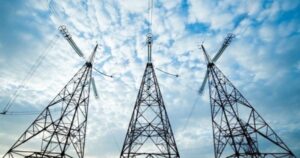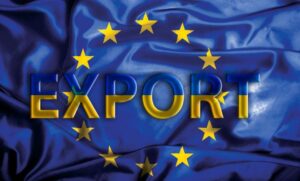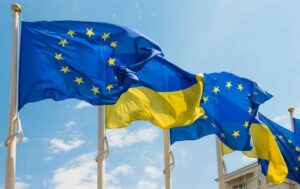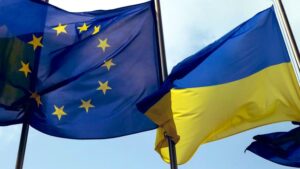
A EUR100 million grant agreement has been signed by Volodymyr Kudrytskyi, Chairman of the Board of NPC Ukrenergo, and Lorenz Gessner, Head of the Representative Office of the German state development bank KfW in Ukraine, the company said.
According to its Telegram post on Friday, the signing took place in Kyiv on Thursday in the presence of Deputy Energy Minister Roman Andarak and members of the EU Delegation to Ukraine.
It is noted that the European Commission has authorized KfW to provide Ukrenergo with funds from the EU’s special budget program Ukraine Investment Facility and to ensure the financing and implementation of a number of priority energy projects.
These include the modernization of high-voltage substations in the western regions of Ukraine and the development of interconnectors connecting it to the power system of continental Europe, as well as the repair and restoration of equipment destroyed or damaged by Russian shelling at high-voltage substations, and the purchase and supply of new equipment.
In addition, part of the funds should be used to strengthen the physical protection of Ukrenergo’s substations.
NPC noted that this grant is the second phase of the target program “Reconstruction and Restoration of Ukraine’s Electricity Transmission Infrastructure”, as the company signed an agreement with KfW on the first phase of the program worth EUR 15 million at the Berlin Conference on the Restoration of Ukraine-2024 in June.
In total, since the beginning of the full-scale war, Ukrenergo has attracted EUR324 million with the support of KfW, and the total amount of international assistance attracted amounted to EUR1.5 billion, the NPC summarized.

Ukraine is exhausting its tariff-free quotas for honey, corn and chicken supplies to the European Union, European Commissioner for Agriculture Janusz Wojciechowski said at a conference after the Council of Agricultural Ministers meeting in Brussels on Monday.
“I am pleased that today, during the discussion on Ukraine, member states generally expressed positive views on the new autonomous trade measures and on the safeguard measures introduced. It was the initiative of the European Commissioner for Agriculture to introduce these import limits, and they are working. They were activated for three products – sugar, eggs and oats. We are observing the situation with other sensitive products. Honey, whose exports have already reached 89% of the limits, corn – 67%, and chicken – 59%,” he said.
Wojciechowski emphasized that European politicians’ accusations against the EU’s Common Agricultural Policy that it is aimed at reducing domestic production and further increasing dependence on imported products are unfounded. The EU has been and will remain the largest exporter of agricultural products in the world, he assured.
According to the European Commissioner, the EU’s agricultural trade surplus in 2023 reached a record EUR 70 billion. This year, this record may be broken, as in the first quarter alone, the EU’s trade surplus with third countries already amounted to EUR 18 billion.

In January-June 2024, Ukraine exported $10.97 billion worth of goods to the European Union, which is 9.7% less than in the first half of 2023, Deputy Minister of Economy and Trade Representative of Ukraine Taras Kachka said.
“This is an obvious correlation of transportation routes. Exports to the EU decreased the most to neighboring countries – to Poland by 25.7%, to Slovakia by 21.3%, to Hungary by 67.2%, and to Romania by 50.2%. On the other hand, exports to Spain (81.1%), Italy (24.7%), and the Netherlands (22.4%) increased significantly,” he wrote on Facebook.
Kachka pointed out that this correlation makes it possible to clearly see trade with the EU without forced transit to third countries.
“This will allow us to resolve a lot of problems that have accumulated in relations with neighboring countries,” he suggested.
The Ukrainian trade representative emphasized that the existing problems show that in 2022-2024 Ukraine has significantly narrowed the range of “sensitive” goods in trade. Before the war, these included steel, which was subject to trade protection, and 36 categories of agricultural products that were subject to temporary liberalization, or quotas.
He reminded that under the current phase of autonomous trade measures, the number of such sensitive products has been reduced to seven: poultry, eggs, sugar, honey, corn, oats, and cereals.
Commenting on the European Commission’s quotas on Ukrainian sugar and eggs, Kachka noted that active exports from Ukraine have reached certain thresholds.
“If the sugar trade with the EU is suspended to normalize trade in accordance with the decision of the Ukrainian side, the export of eggs will continue. We expect that the general EU quota within the WTO will apply to Ukrainian products and a reduced duty of EUR15.2 per 100 kg (quota 09.0154) will be applied,” he wrote, adding that all these nuances have been discussed with both the EU and the market.
The Ukrainian trade representative emphasized that Ukraine’s common goal is to resolve all sensitive issues with the EU and define clear parameters of trade under the Association Agreement by June 5, 2025.

In January-June 2024, Ukraine exported $10.97 billion worth of goods to the European Union, which is 9.7% less than in the first half of 2023, Deputy Minister of Economy and Trade Representative of Ukraine Taras Kachka said.
“This is an obvious correlation of transportation routes. Exports to the EU decreased the most to neighboring countries – to Poland by 25.7%, to Slovakia by 21.3%, to Hungary by 67.2%, and to Romania by 50.2%. On the other hand, exports to Spain (81.1%), Italy (24.7%), and the Netherlands (22.4%) increased significantly,” he wrote on Facebook.
Kachka pointed out that this correlation makes it possible to clearly see trade with the EU without forced transit to third countries.
“This will allow us to resolve a lot of problems that have accumulated in relations with neighboring countries,” he suggested.
The Ukrainian trade representative emphasized that the existing problems show that in 2022-2024 Ukraine has significantly narrowed the range of “sensitive” goods in trade. Before the war, these included steel, which was subject to trade protection, and 36 categories of agricultural products that were subject to temporary liberalization, or quotas.
He reminded that under the current phase of autonomous trade measures, the number of such sensitive products has been reduced to seven: poultry, eggs, sugar, honey, corn, oats, and cereals.
Commenting on the European Commission’s quotas on Ukrainian sugar and eggs, Kachka noted that active exports from Ukraine have reached certain thresholds.
“If the sugar trade with the EU is suspended to normalize trade in accordance with the decision of the Ukrainian side, the export of eggs will continue. We expect that the general EU quota within the WTO will apply to Ukrainian products and a reduced duty of EUR15.2 per 100 kg (quota 09.0154) will be applied,” he wrote, adding that all these nuances have been discussed with both the EU and the market.
The Ukrainian trade representative emphasized that Ukraine’s common goal is to resolve all sensitive issues with the EU and define clear parameters of trade under the Association Agreement by June 5, 2025.

An agreement between Ukraine and the EU on security guarantees will be signed on Thursday in Brussels at a meeting of the European Council.
“We will have a special guest, whose name we are not allowed to mention, but you all wrote about it, so we don’t have to confirm it. And you also know that tomorrow, after the family photo (of the EU leaders – IF-U), a security commitment (between Ukraine and the EU – IF-U) will be signed,” a senior European diplomat told reporters in Brussels on Thursday.
He did not name the “special guest,” but earlier European media had reported on the visit of Ukrainian President Volodymyr Zelenskyy to Brussels.
The EU summit will be held in Brussels on June 27-28.
Answering journalists’ questions about how similar the content of this document is to the many security agreements already signed with the EU countries, the diplomat noted that “not all member states have signed agreements with Ukraine.” “The EU is a kind of umbrella in which everyone will assume obligations, and everyone will contribute by approving these security commitments,” the source explained.
At the same time, he emphasized the importance of the current meeting of the European Council, which will be the first after the elections to the European Parliament. “This is a new cycle that opens now with a clear idea of what the strategic agenda will be, how the leaders of the European Council intend to shape other institutions and work for the next five years – this is one part of the decision that will be made, and the second part is the names and team that will be responsible for implementing and working on this program,” the diplomat explained.
The EU leaders are expected to approve candidates for senior positions in the EU: President of the European Commission (the leaders are expected to approve the current President Ursula von der Leyen for a second term), President of the European Council (previously discussed the candidacy of former Portuguese Prime Minister Antonio Costa), High Representative of the EU for Foreign Affairs and Security Policy (previously nominated for this position was Estonian Prime Minister Kaja Kallas) and President of the European Parliament (discussed the re-election. ..).
In addition, the agenda will include issues of competitiveness, security and defense, migration, and the Middle East.

The EU says that the negotiations on Ukraine’s accession to the European Union will be rigorous and demanding, and that it will be up to EU member states to decide whether all the conditions for completion have been met.
“The accession negotiations that we are starting today will be rigorous and demanding. Thanks to your determination and commitment, we are confident in your ability to bring this process to a successful conclusion. We will support you in your efforts, and we look forward to welcoming you as a fully-fledged member of the European Union,” said Hajia Labib, Minister of Foreign Affairs of Belgium, which holds the EU presidency, at the opening of the Intergovernmental Conference in Luxembourg on Tuesday, marking the start of official negotiations on Ukraine’s accession to the EU.
She clarified that it is the EU member states that will decide whether the conditions for completing the negotiations have been met, taking into account changes in EU legislation since the opening of the negotiations and Ukraine’s readiness for membership.
Presenting the approved framework for the negotiations, the Minister said that it is based on “taking into account the experience of past enlargements and ongoing accession negotiations, as well as EU legislation, and properly reflects Ukraine’s advantages and characteristics.” “The negotiations are aimed at ensuring that Ukraine fully adopts EU norms and ensures their full implementation and compliance. The negotiations also include a revised enlargement methodology, which ensures an even greater focus on fundamental reforms in the accession negotiations. Therefore, Ukraine will need to fully adopt and continue to implement reforms in the areas of rule of law and fundamental freedoms, strengthening democratic institutions and public administration reforms, as well as economic criteria,” the Minister elaborated.
In addition, Ukraine will need to pay special attention to judicial reform, the fight against corruption, and the protection and non-discriminatory treatment of persons belonging to national minorities. “To ensure that progress in these areas is irreversible and fully and effectively implemented, progress will be closely monitored by the Commission, which will report regularly to the Council,” Labib said.
According to her, “the progress in the implementation of the fundamental cluster (the cluster on fundamental values) will be crucial throughout the process of these reforms, which will determine the overall pace of the negotiations.” “This will give enough time to create the necessary legislation, institutions, and a solid track record of implementation before the end of the negotiations. The screening reports to be prepared by the Commission will contain substantial recommendations, in particular on the tasks to be addressed in the roadmaps adopted by the Ukrainian authorities,” the minister added.
At the same time, Labib expressed the expectation that Ukraine, as a future member state, will adhere to EU values, “namely, respect for human dignity, freedoms, democracy, equality, the rule of law, the rule of law and respect for human rights, including the rights of individuals to belong to minorities.” “In addition, accession to the EU provides for the timely and effective implementation of all EU legislation or the EU acquis as it existed at the time of accession. In accordance with the revised enlargement methodology, the development of sufficient administrative and judicial capacity, as part of the fundamental cluster, is key to fulfilling all the obligations arising from membership. Good neighborly relations with EU member states and other enlargement partners remain important,” she said.
The minister said that the EU welcomes “Ukraine’s strategic commitment to its EU path and its high coherence with the EU’s common foreign and security policy and its restrictive measures”. “We encourage Ukraine to continue this positive trend towards full coherence, in line with respect for the principles of sovereignty and territorial integrity, including for EU members. Coherence with the EU’s foreign and security policy is a key aspect of the EU integration process and a clear expression of a strategic choice.”
In addition, according to Labib, in parallel to the accession negotiations, the Union and Ukraine will continue their dialogue with civil society and cultural cooperation in order to “bring people closer together and ensure that citizens support the accession process.” “We expect Ukraine to continue to strategically communicate the benefits and commitments of the accession process and EU membership to its public, including by combating disinformation,” she said.